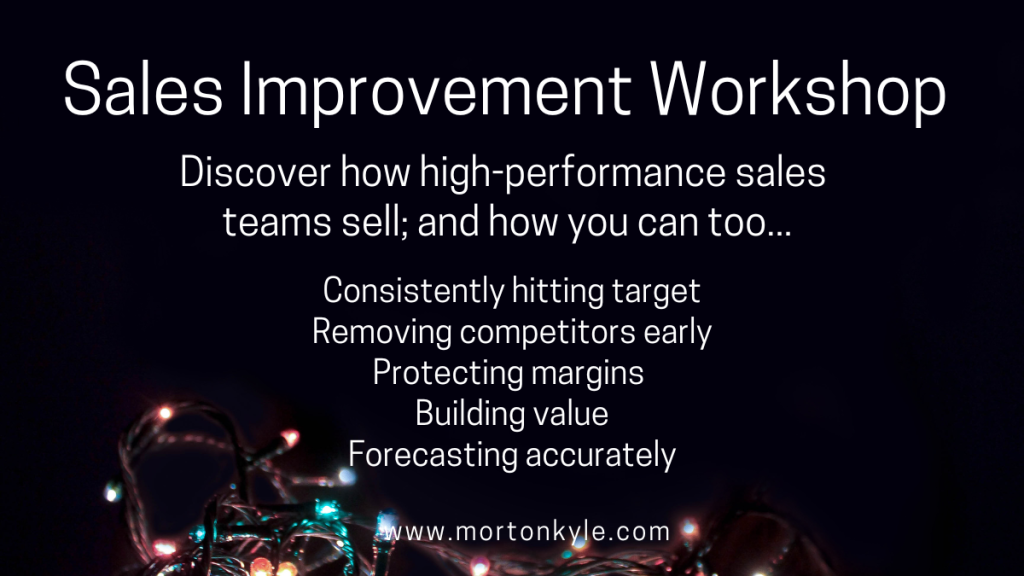Being skilled in asking great sales qualification questions is the key to success in selling, the quality of your sales discovery questions is directly related to your sales close rate!
In fact, I can guarantee that if you can ask great sales qualification / sales discovery questions then you will automatically be near the top of the sales leader board…
I know this because I’ve observed that it’s the primary critical failing in under-performing sales functions.
Failure to ask the right type of questions at the right time, in the right way and with the right intent.
Get it wrong?
BOOM!
You’re out – do not pass go. Do not collect any revenue or commission.
Did you know that most buyers need you to take control of this part of the call?
They do!
Only they don’t want you to broadcast to them – they want to be involved.
Sales qualifiacation questions based on gaining information and swapping it for value with the client is your ideal strategy if you’re looking to
- Shorten sales cycles
- Exclude competitors and
- Move sales leads from open to closed smoothly whilst
- Maximising sales conversion rates
Value based sales discovery questions feed every single part of the sales call structure AND it’s is almost impossible to confidently close without having asked those critical questions.
Sales Qualification Questions
Here’s a list of different generic types of discovery and sales qualification questions that a salesperson might use in a B2B sales call with a senior decision maker.
These questions are designed to gather information about the prospect’s needs, pain points, goals, and decision-making process.
Remember, effective questioning involves a mix of open-ended, probing, and clarifying questions to engage the prospect in a meaningful conversation.
I’ve groups the sales discovery questions so you can use the general framework / subject heading to develop other questions around these.
Note…whilst it’s important to ask the qualification questions – it’s also important to understand WHY this question is important to you and the prospect.
Hope you find them useful!
If you’d loke more help developing a set of sales qualifications specifically for your sales team then join us on The Sales Discovery Workshop

Basic Generic Sales Discovery Questions Listed By Type
Note – these questions are generic, so you’ll need to think about how they apply to you and how you might need to rework the question to get the information you need, provide value to your prospect, and move the call forward logically….
- Background and Context Questions:
- Can you give me a brief overview of your company’s current operations and goals?
- What challenges or opportunities is your company currently facing in the industry?
- Current Situation Questions:
- What solutions or strategies are you currently using to address [specific challenge]?
- How are you measuring success or performance in [specific area]?
- Goals and Objectives Questions:
- What are the main goals or priorities your team/company is looking to achieve in the next [timeframe]?
- How do you envision our product/service aligning with your company’s long-term objectives?
- Pain Point and Challenge Questions:
- Can you elaborate on the difficulties you’re encountering with [specific problem]?
- How are these challenges affecting your team’s efficiency, productivity, or overall performance?
- Value and Benefits Questions:
- What potential value do you see in adopting a solution like ours?
- How do you envision our product/service impacting your company’s bottom line?
- Budget and Resources Questions:
- Do you have a budget allocated for addressing [specific issue]?
- How do you typically allocate budget for new solutions or projects?
- Decision-Making Process Questions:
- Who are the key stakeholders involved in the decision-making process for this type of solution?
- What factors are most important to your team when evaluating potential vendors?
- Timeline and Urgency Questions:
- Are there any time-sensitive factors that are influencing your decision-making process?
- What is your preferred timeline for implementing a new solution?
- Competition and Alternatives Questions:
- Are you currently evaluating any other solutions or alternatives to address [specific problem]?
- What criteria are you using to compare different options?
- Implementation and Support Questions:
- How do you envision the integration of our solution into your current workflow?
- What kind of support or resources would your team require during the implementation process?
- ROI and Measurement Questions:
- How do you measure the success and return on investment for new solutions in your company?
- What metrics or benchmarks would indicate a successful implementation for you?
- Risk and Concerns Questions:
- Are there any potential risks or concerns you foresee in adopting a new solution like ours?
- What steps do you usually take to mitigate risks associated with new technology implementations?
Remember, the key to successful B2B sales conversations is to actively listen, keep it conversational , and adapt your questions based on the prospect’s responses. That’s why your sales discovery questions need to be free flowing and expansive…so that the buyer feels heard and understood
While you’re considering all that – did you know that
The Quality of Your Questions Will Impress Your Sales Prospect Way More That Your Sales Pitch Will!
You know why?
Because the sales pitch is all about you.
The qualification questions – if they are the right type of questions – are all about the buyer. The buyer is doing the talking, the buyer is in control, the buyer is the active part.
That’s why your qualification questions are so value-able.
Deny the prospect or the buyer is / her right to have their say and outline their vision then you can watch the odd of you closing this deal positively drop like a stone!
That’s Why GREAT Sales Qualification Questions are So Important!
Ask the right kind of sales discovery questions, in the right way, the right order, going deeper as needed, is helping you get your prospect in to the state that all buyers need to be in before they even consider buying!
Before you can ask for the business with a high level of confidence to get the answer you want then the buyer MUST start selling your solution to themselves!
This really is the first rule of effective, high performance, high converting sales prospecting and closing.
During the qualification process the prospect is sorting out their thoughts.
Following the sales structure we use in The Sales Improvement Workshop – by the end of the qualification process – the buyer has already started to sell your solution to themselves.
Watch carefully and you can see thus happen.
Unless you;re too busy broadcasting that you miss it.
Ouch!
Get your Prospect Selling to Themselves!
Think what happens after the qualification and discovery part of the sales call…at some point you need to stop asking questions and you need to bring all that great information you’ve collected into some kind of summary section – we cover this in our Sales Improvement Workshop so check it out, or you can look at our Sales Structure page

When you pull all that lovely, juicy info together about their current situation, they current challenges, what they’ve tried/not tried etc etc etc…the you hopefully have everything you need to know.
And, it’s all the the clients own words.
Now – the next step is critical.
Your job is to formulate and summarise what the prospect has told you and feed that back to them using the prospects words!
This is so powerful.
AT this stage – whatever you say to the prospect should get the prospect nodding their head in agreement…
This is what I call the nodding dog stage.
Whilst the prospect is in this dreamlike state of having their wise words fed back to them smart and successful sales people will start weaving in their insights and wisdom based on their experience of dealing with other buyers like this.
This is subtle, careful, soft and invokes curiosity in the buyer.
Hard stop!
You can do none of this is you’ve not completed a deep, thorough, logical, searching and comprehensive sales discovery.
Fact
This is the NUMBER 1 skill of high performance sales people.

Making Sales Qualification and Sales Discovery Easier For You
Before you dig in here and start using these sales qualification questions on auto-pilot, please just back up for one minute.
Thhs is a generic guide – and as such the words are no where near as important as the INTENT!
To use these questions to really gain traction and impact then you need to understand a couple of things:
You need to understand the:
- WHY around ‘why are you asking this question?’
- WHAT around ‘what are you trying to achieve with this question?’
- WHAT around ‘what are you going to do with the information you get from asking this question?’
- HOW around ‘how are you going to use this information to build value and increase the impact of your solution?’
- WHEN around ‘when should you ask this question?’
The other thing you need to remember is this – these questions are GENERIC.
That means they are not fully formed – you still need to do the application work SO YOU CAN FULLY TAILOR THESE QUESTIONS TO YOUR NICHE / SECTOR / BUYER TYPE
Here’s a list of questions under each of the question types I provided earlier: think about this as the next stage….BUT there are still 2 stages deeper than this that we look at in The Sales Improvement Workshop

Background and Context Questions:
(be careful using these questions in this section as a good sales rep will have done their background research!)
- Can you provide more details about your company’s core products/services and the industries you serve?
- How has your company evolved over the past few years in response to industry changes?
- What major milestones or achievements has your company reached recently?
- Can you share any insights into your company’s competitive landscape and market positioning?
- What are the main drivers behind your company’s growth strategy?
Current Situation Questions:
- How are you currently addressing [specific challenge] within your organization?
- What systems or tools do you currently have in place to manage [specific process]?
- How satisfied are you with your current [specific solution] and what improvements are you seeking?
- Can you describe any pain points your team is experiencing in [specific area]?
- What data or metrics are you using to evaluate the performance of your current solutions?
Goals and Objectives Questions:
- What are the top three priorities for your company in the next [timeframe]?
- How does [specific goal] contribute to your overall company strategy?
- Can you share examples of how achieving [specific goal] would positively impact your business?
- What specific metrics or outcomes do you hope to achieve with new solutions?
- Are there any emerging trends or shifts in the industry that are influencing your strategic goals?
Pain Point and Challenge Questions:
- How has [specific challenge] affected your team’s daily operations and overall productivity?
- Can you elaborate on any specific pain points or bottlenecks your team is facing?
- What attempts have been made to address [specific problem], and what results were achieved?
- How does [specific challenge] impact your customer satisfaction and engagement?
- In what ways does [specific issue] hinder your ability to stay competitive in the market?
Value and Benefits Questions:
- From your perspective, what would be the key benefits of implementing a solution like ours?
- How would [specific solution] contribute to cost savings or revenue growth for your company?
- Can you envision any potential long-term advantages of integrating our solution into your workflow?
- How would [specific solution] enhance collaboration and communication among your teams?
- What strategic advantages do you believe our solution could offer over your current approach?
Budget and Resources Questions:
- Do you have a budget allocated specifically for addressing [specific challenge] this fiscal year?
- How does your company typically allocate budget for new technology or software solutions?
- Are there any additional resources (financial or human) that would be required for successful implementation?
- What factors influence your decisions when it comes to budgeting for new projects?
- How open is your team to adjusting budgets for solutions that promise substantial ROI?
Decision-Making Process Questions:
- Who are the key decision-makers and stakeholders involved in evaluating and selecting new solutions?
- Can you outline the typical steps and stages your team follows when making purchasing decisions?
- What criteria or attributes are most important to your team when considering new vendors?
- How does your team gather and assess information from different potential vendors?
- Are there any internal processes or protocols that need to be followed during the decision-making process?
Timeline and Urgency Questions:
- Is there a specific timeframe within which you would like to have a solution in place for [specific issue]?
- Are there any external factors or events driving the urgency to address [specific challenge]?
- How flexible is your timeline for implementing new solutions?
- What potential roadblocks could impact the timeline for solution deployment?
- Are there any specific dates or milestones you’re working towards in relation to [specific goal]?
Competition and Alternatives Questions:
- Besides our solution, are there any other alternatives you’re considering to address [specific problem]?
- How familiar are you with our competitors and their offerings in this space?
- What specific features or capabilities do you believe set our solution apart from competitors?
- What criteria do you use to evaluate and compare different potential solutions?
- Have you had any experiences with similar solutions in the past, and if so, what did you learn from those experiences?
Implementation and Support Questions:
- Can you provide insights into your team’s preferred approach to integrating new solutions into existing workflows?
- What level of support or training would your team require during the implementation phase?
- Are there any potential challenges you foresee in terms of integrating our solution with your current systems?
- How do you typically handle change management when introducing new technology to your team?
- What are the key factors that contribute to a successful implementation process from your perspective?
The Value Based Sales Discovery Questions
Thre is a direct correlation between high quality, value based sales qualification questions and sales conversion rates.
In our Sales Improvement Workshop we spend a whole 2 days building an intelligent, logical, value based sales call structure and process to help you close more business with higher margins and in less time.
Come and join us. You won’t regret it!
For more details call Carol on 0779 002 1885
This is the only way to really capture your buyers logical and emotional decision making process and harness it so that the procespect starts selling your solution to themselves.
Can you afford to wait any longer?
I’ve been using these sales improvement principles for over 15 years – they work!
What Increase in Sales Conversion, Revenue and Margin are you looking for?


Hi, thanks for visiting….if you’re looking to increase or optimise your sales results, then please book a call to discuss how I can help you (use the links at the end of this box for direct message options) If you need a few more details, then here you go…. I’m an experienced data-driven, analytical sales trainer and sales improvement specialist. Proud to design sales training and sales improvement solutions that stick! Happy to share some insights if you want a quick steer – just book a call, especially if you’re not seeing the sales results you’d like, you’re struggling to know what to do next, or you’d really like to give your competitors something to worry about!
What’s you sales challenge?

